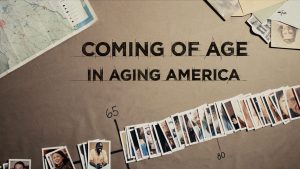Coming of Age in Aging America: What Happens When Half of the Population is Over 50?

What will it mean for us all to grow up, live, and age in a society where half the citizens are over the age of 50? This has never been our reality, but we are getting closer. We are an aging society, and the graying of our citizens isn’t temporary—it is a permanent historic transformation.
We are beginning to undergo a demographic shift in the history of our country, where we’ll have a lifespan 20 years longer than our parents or grandparents. This is huge. What do you do with those 20 years? What does that 20 years mean? Coming of Age in Aging America is a PBS documentary broadcast and public engagement project that urges a national conversation about our new reality on how institutions can adapt to a graying society where people are living longer.
In Coming of Age in Aging America, characters, stories and revealing new research carry the central themes of work, community and intergenerational relationships. The film explores a Georgia community that is redesigning itself; a large medical system remodeling its work environment under the banner of ‘A Life Well-Lived’ to retain older workers and invite younger ones; and a classroom of young college students as they begin to grapple with the idea of longer lives – intellectually and emotionally.
These are some of the main themes explored by the documentary:
- It’s about the structures: An aging society is not just about its people. It is about structures and the homes and families and the infrastructures (such as the transportation infrastructure) that all of us rely on but were built for a different demographic.
- Aging is not only individual, it’s societal: Rather than looking at aging as an individual predicament, the documentary makes connections to social policies and institutions, tackling topics such as how we work and where we live and how those arrangements could—or should—be updated to meet the current reality.
- The segment titled, “How We Work” looks at the way jobs and the workplace are changing (and must change) as the nation’s older population grows. These modules tell individual stories while delving into larger questions, such as the new norm of delayed retirement. Today, three out of four Americans 50 or older say they expect to go on working well beyond the traditional retirement age; one in five who have passed that age are still on the job. Before an extended work life becomes something to look forward to, society’s expectations about later life must change, along with business practices, social policies, and attitudes toward aging.
According to Christine Herbes-Sommers, the film’s producer, the interesting thing about the film is that “the most startled audience has always been young people — 16 to 25 year olds — who come up and say, ‘I never thought of that’ or ‘maybe I should be saving for my retirement now.’”
Herbes-Sommers expects Coming of Age in Aging America to be her last film, but she is about to launch a multiyear engagement project with partner institutions, such as the Stanford Center on Longevity and Temple University’s Communities for All Ages program, to develop plans for action to improve the way we live now that so many of us are living longer.
The animated trailer for Coming of Age in Aging America, called The Big Idea in 4 Minutes, is already getting a lot of play at conferences on aging and can be viewed here. Coming of Age in Aging America will be available here to view for free until August 1, using the password Aging. To get the dialogue started, the project also created an interactive website that focuses on the same urgent issues, and has mounted an ambitious campaign to engage the public in discussions about what it means to age in an aging world.
What if you lived 20 years longer than you ever expected?
Want to live longer? Most people do! You can’t do anything about genetics, unfortunately, but to better your own odds of living longer, focus on what you can do to be healthier, such as eating healthy, exercising, and minimizing stress. As you are taking care of yourself and enjoying your life, it is also a good idea to plan for your future and for your loved ones. Our firm is dedicated to helping protect seniors preserve dignity, quality of life, and financial security. If you have not done Incapacity Planning, Estate Planning, or Long-Term Care Planning (or had your Planning documents reviewed in the past several years), or if you have a loved one who is nearing the need for long-term care or already receiving long-term care, please call us to make an appointment for a no-cost consultation:
Fairfax Elder Law Attorney: 703-691-1888
Fredericksburg Elder Law Attorney: 540-479-1435
Rockville Elder Law Attorney: 301-519-8041
DC Elder Law Attorney: 202-587-2797